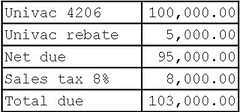 This is a continuation of the topic started in this article
This is a continuation of the topic started in this article and a variation on
this article.
Let's say that Jim, at Jim's Bait Shop, buys his stock from Bill's Wholesale Bait. Jim, as we saw in the previous articles, wouldn't have to pay tax because he's buying it for
resale. The most fundamental sales and use tax exemption is for resale. So Jim's got nothing to worry about. Obviously, he will charge his customers tax on the bait and other tackle that he sells.
Scenario 1Jim got up this morning and decided to take the day off and enjoy his favorite hobby, you guessed it, fishing. So he stops in at the store, takes a tub of his Special Blend out of the cooler, leaves a note for Burt, his bookkeeper, and heads off in the boat.
Now the state wants some money. When Jim bought that bait, he said he was buying it for resale. Which was true at the time. But then Jim
changed his mind and took some of the inventory and "converted it to use." In other words, he didn't resell that particular tub of bait. He
used it.

Hopefully, Burt has been to a seminar or two and knows about this problem. If he does it right, he'll be making a journal entry to reduce the inventory for that tub of bait, and he'll also be accruing the 8% use tax as well. Since Jim didn't pay sales tax when he bought it, he now owes use tax when he uses it instead of selling it.
Scenario 2Jim does a chamber of commerce show and gives away small tubs of Special Blend at his booth. He
used them as advertising premiums, therefore he owes use tax. Remember, he didn't pay tax when he bought the bait. But now he's used it. He's converted his inventory to use.
Scenario 3Then there's Mary Kay. Mary Kay is a champion in bass fishing tournaments. She likes Jim's Special Blend and proposes a sponsorship deal. She'll use his bait (and wear the appropriate patches, etc) if he
gives her 100 tubs of bait a year. He hasn't sold her 100 tubs of Special Blend, he's
given it to her. Since he didn't sell it, he owes use tax on his cost of that bait. He used that inventory by giving it away.
Scenario 4This applies to inventory that he gives to charity as well. Let's say the local Girl Scout troop wants to host a fishing derby (the stories just get weirder and weirder, folks) and they ask Jim for a donation of bait. Jim is happy to oblige and donates 50 tubs of Special Blend - essentially the same deal as with Mary Kay. You might think, "The Girl Scouts are tax exempt!" Yes, but not necessarily as far as Jim's donation. About half the states will say that Jim doesn't have to pay use tax on donated inventory. The other half will make him pay. You need to check the law in the relevant state.
Scenario 5
Finally, an old customer, Tony storms into Jim's establishment and demands a refund. The "Special Blend" didn't work! Jim apologizes and says that he had trouble a couple of days ago too. He offers Tony three tubs of the latest batch. Tony leaves happy. Jim leaves another note for Burt. Burt will have to make another journal entry reducing inventory and accruing the use tax on those three tubs because Jim
used them by giving them away.
The term I used earlier, and that I've used for a long time is "conversion to use." Jim converted his inventory, which wasn't taxable, to use in all five examples above. Which means Jim owes use tax.
So the take-away here is that, if you sell stuff, you need to account for any situations
where your stuff is taken out of inventory and wasn't sold. If you use it on your own, give it to a customer for goodwill or as a prototype, use it as a advertising premium or in trade, or give it away, you owe use tax. You used it.
About the only situation where your inventory can "go away" without you owing use tax is if you throw it away. And I've seen at least one state where manufacturers would have to consider scrap materials thrown away as used.
By the way, it's easy for a sharp auditor (big assumption) to catch this one. Remember poor old Burt. He's been making journal entries to reduce the inventory each time Jim gives away some inventory. All the auditor has to do is go through the inventory general ledger account and look for any entries reducing inventory for purposes other than sales and she's got you.
The solution is actually pretty simple. Whenever you make a journal entry to reduce your inventory, make sure you check to see if you owe use tax. And accrue it if you do.
Sales Tax GuySee disclaimer
Here's information on our upcoming
seminars and webinars And we do
coaching!And please don't forget to visit our advertisers!
Picture note: the pictures above is hosted on Flickr. If you'd like to see more, click on the picture.
 There are plenty of articles in the news these days about how state and local sales tax revenues are plummeting. And there are a couple of editorials about sales tax policies that reflect a lack of understanding by the editors at the Philadelphia Inquirer and the PressofAtlanticCity.com
There are plenty of articles in the news these days about how state and local sales tax revenues are plummeting. And there are a couple of editorials about sales tax policies that reflect a lack of understanding by the editors at the Philadelphia Inquirer and the PressofAtlanticCity.com


















